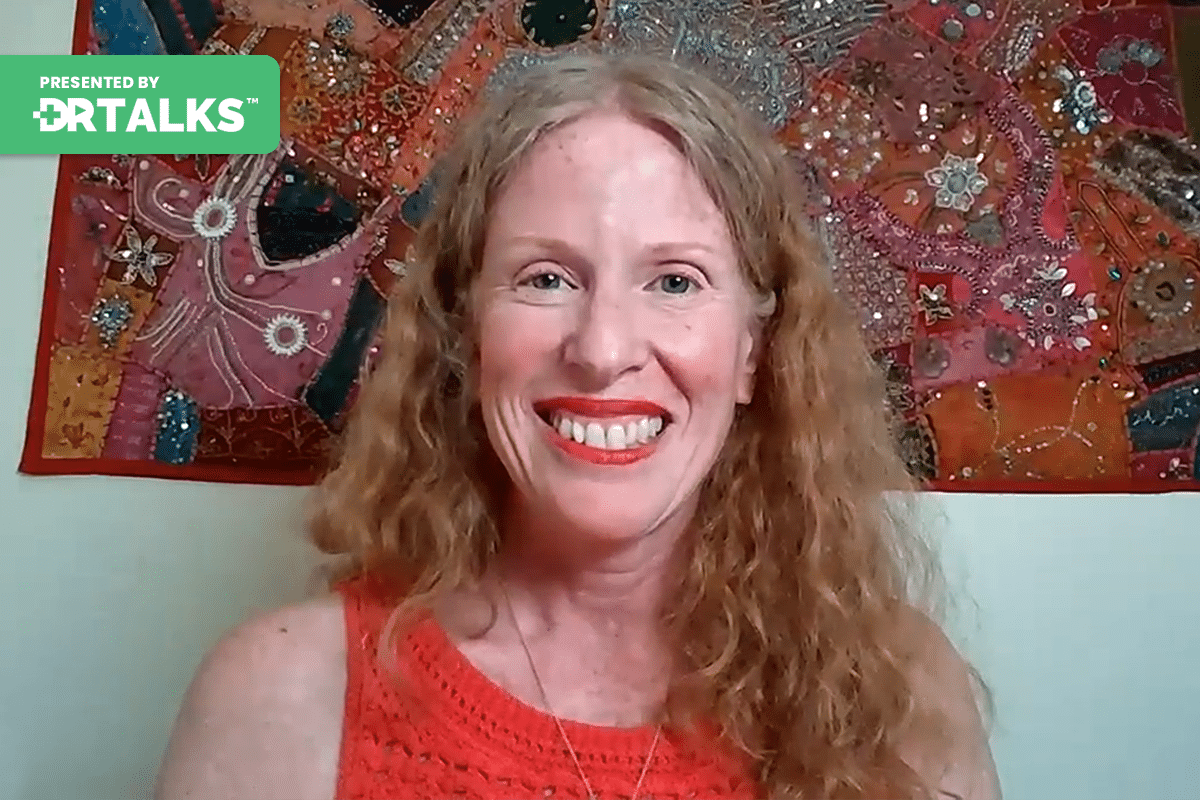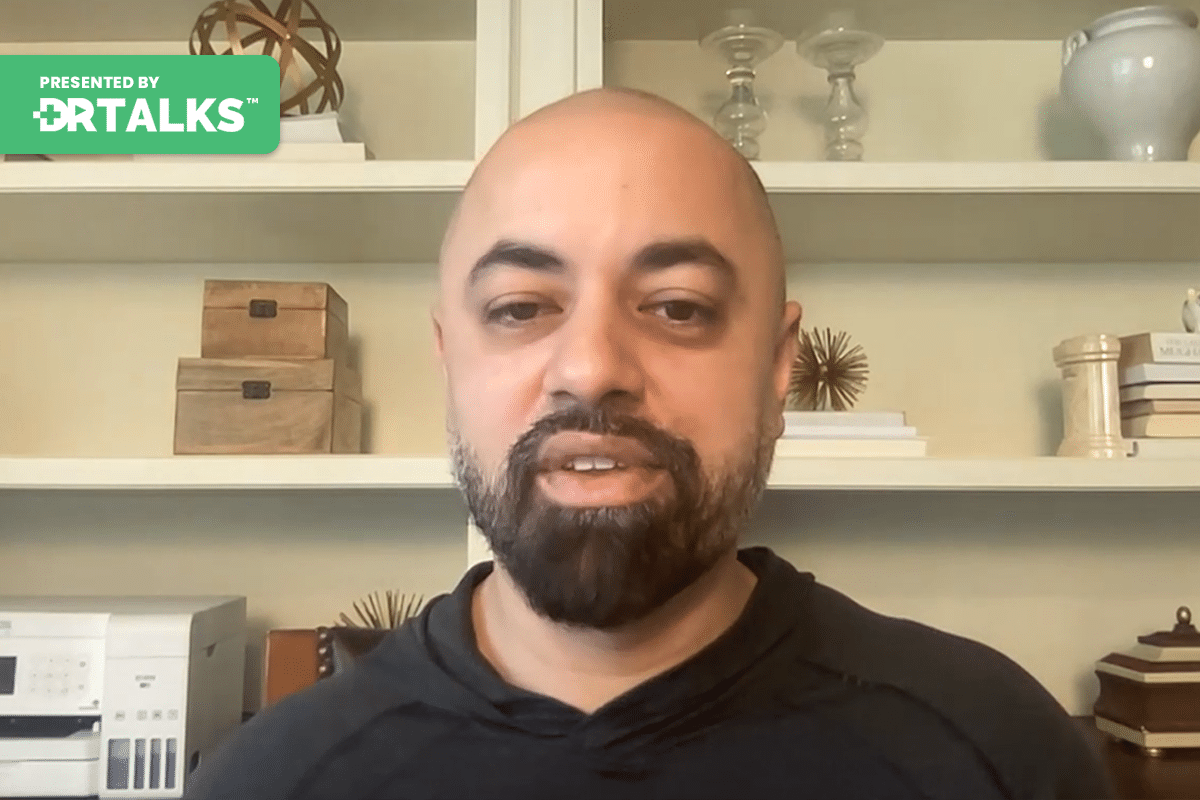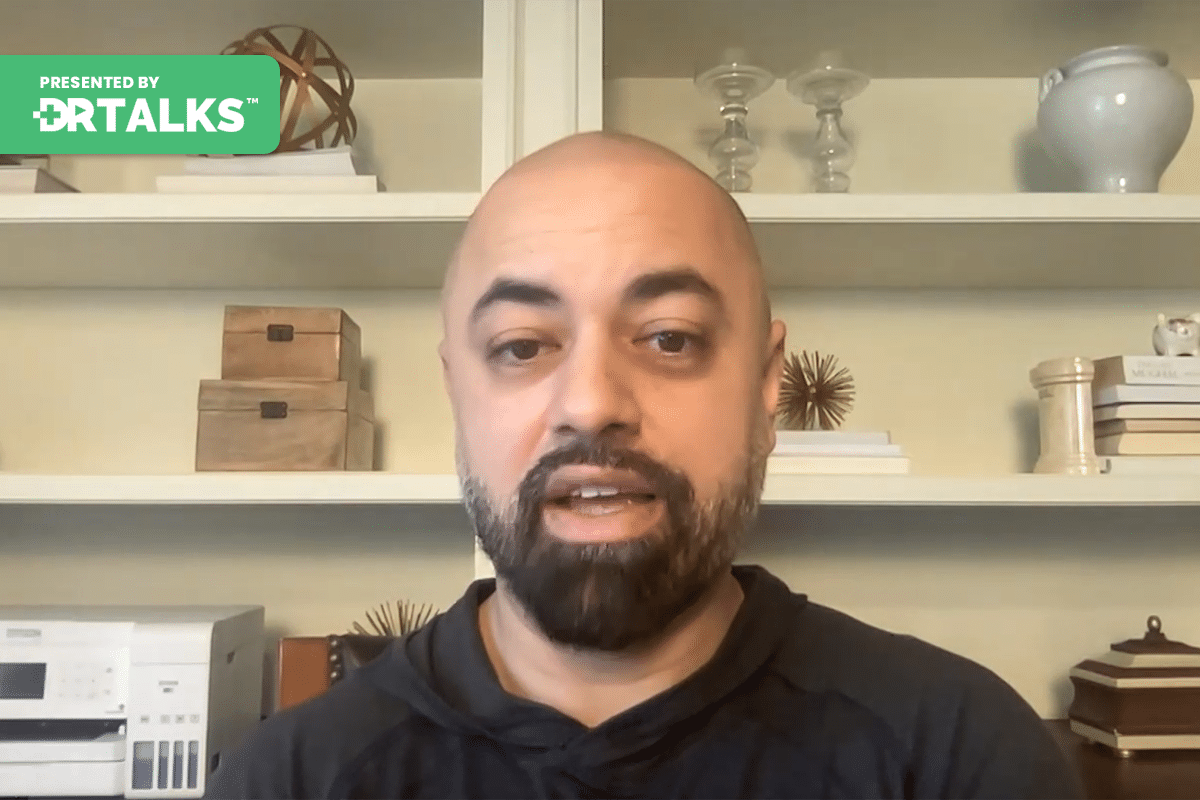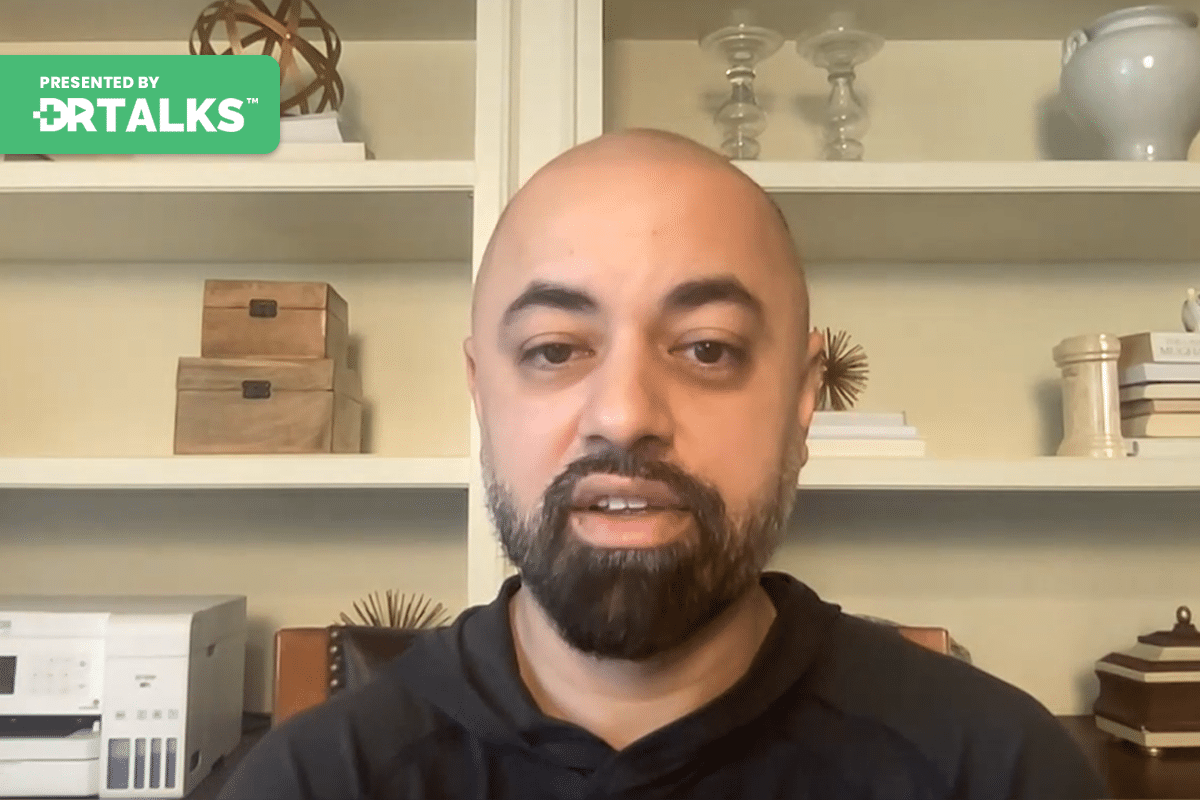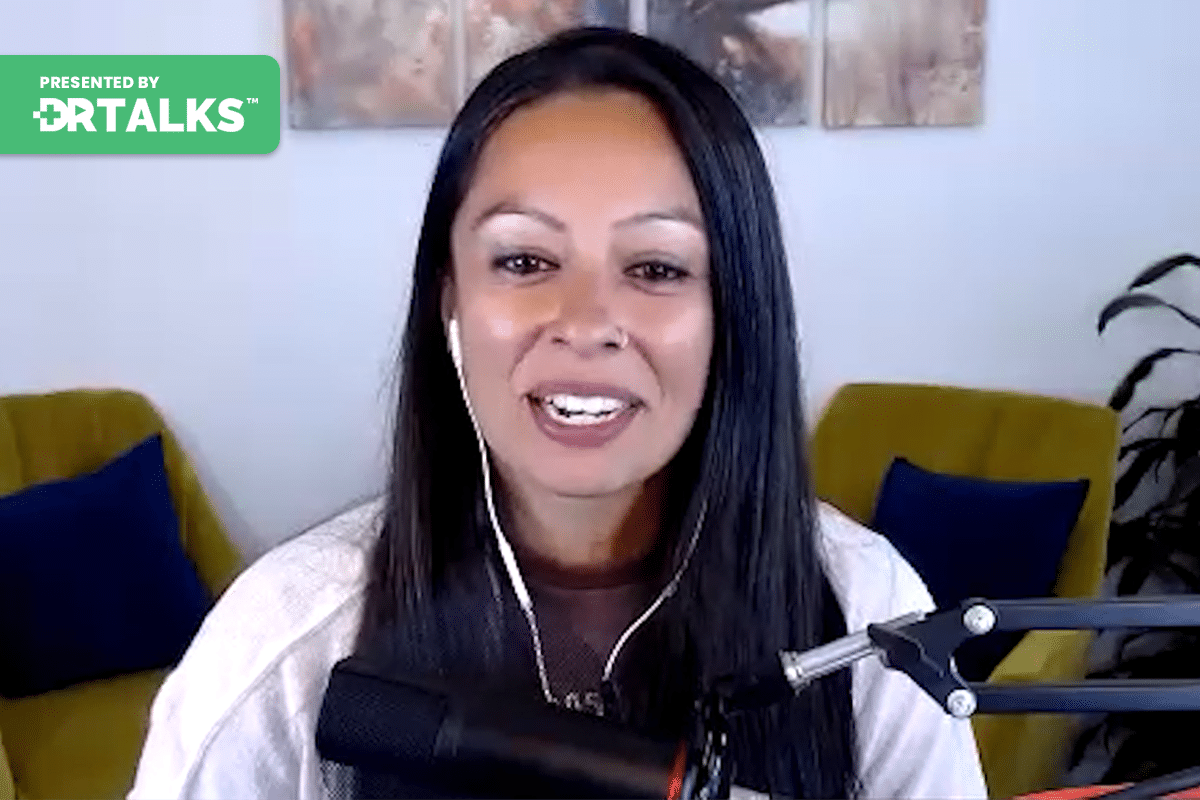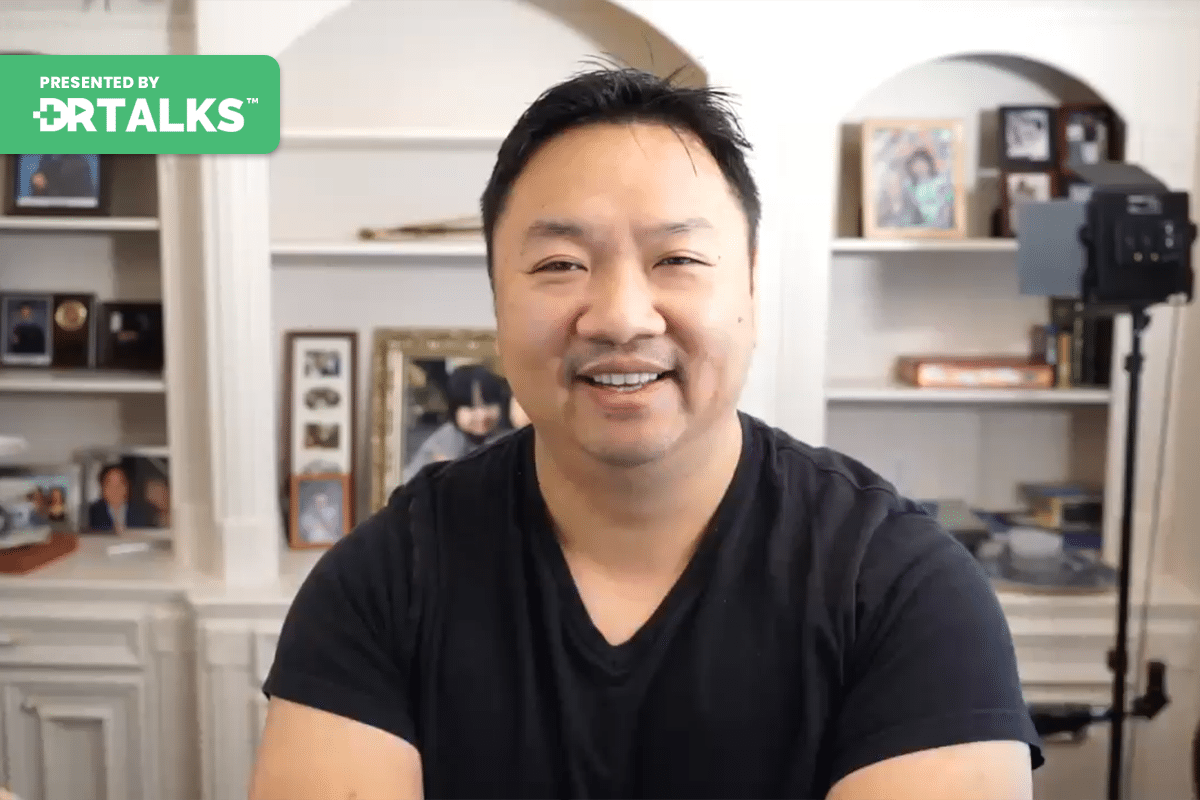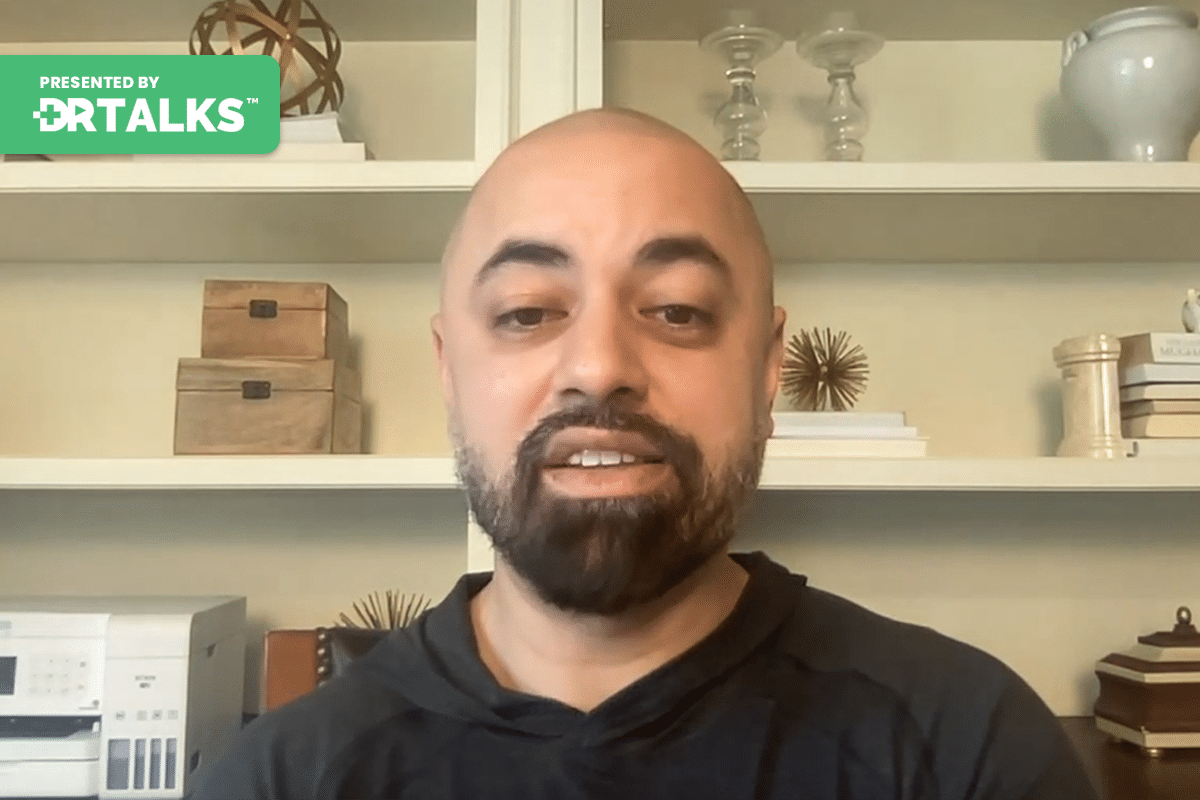Join the discussion below
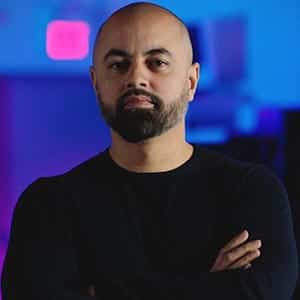
Kashif Khan is the Chief Executive Officer and Founder of The DNA Company, where personalized medicine is being pioneered through unique insights into the human genome. With the largest study of its kind globally, The DNA Company has developed a functional approach to genomic interpretation overlaying environment, nutrition, and lifestyle... Read More
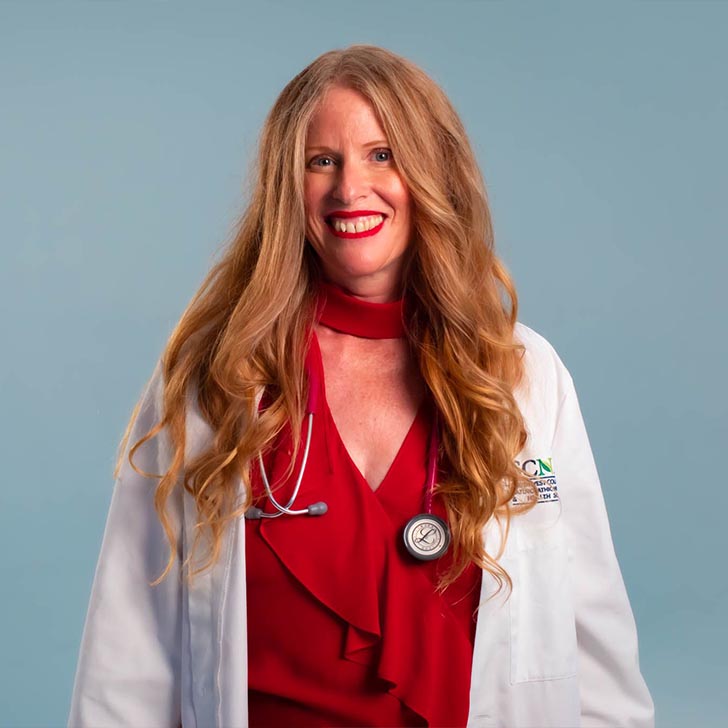
Dr. Sharon Stills, a licensed Naturopathic Medical Doctor with over two decades of dedicated service in transforming women’s health has been a guiding light for perimenopausal and menopausal women, empowering them to reinvent, explore, and rediscover their vitality and zest for life. Her pioneering RED Hot Sexy Meno(pause) Program encapsulates... Read More
- Prepare your body for menopause by understanding and balancing hormones safely, and gain mastery over your menopausal phase
- Discover the empowering steps to pause menopause, and how to use this knowledge to enhance your quality of life
- Become the master of your menopause by embracing a holistic approach that combines hormone balance, nutrition, and mindfulness
Kashif Khan
All right, everybody, we are going to talk to someone that you’re going to enjoy listening to, because I can tell you in our world, we join a lot of other you. You’re listening to us here today. We also speak in participating in a lot of other summits and podcasts, etc.. And when I went onto Dr. Sharon Stills summit and then after that, we went on to a webinar. What I saw was this audience of women that were so loyal and so thankful and so like wowed by what she taught them. All that I knew this was the place to be and we had to have her here with us. And B, because she’s been doing this her whole life. And at first of all, having been through it herself and, you know, then solving for other people, first of all, thank you for being here. This is an honor.
Sharon Stills, ND
Thank you. It’s an honor to be here.
Kashif Khan
Yeah. And I’d like to ask you what from all the things that we’ve done around women’s health, working with you and speaking to your audience and everyone that follow it, just you can see the relief. It’s like, oh, wow, I finally there’s a place to be. Which that’s the thing is that people don’t realize there is relief. It’s not you don’t have to have this crazy hormone rollercoaster if you know what to do. So you yourself, I know have a bit of a personal story and that what which drove you to solve your problem. So can you tell us that?
Sharon Stills, ND
Sure. Yeah. I’ll try to do the condensed version, but I’ll take the whole interview. But I basically was very ill growing up. And, you know, my parents, God bless them, did what they thought was right. They took me to the pediatrician, ended up hospitalized. I ended up on antibiotic after antibiotic and shot after shot and all these things and nothing worked. And I had messed up hormones. I was overweight. I had addiction problems as I went through my teens, I had migraines. I had everything, you know, it was just like I was a total disaster. And it wasn’t until I learned about natural perfect medicine and like, wow, you could change what you’re putting in your mouth and that’ll change your health that you know, Oh, that makes so much sense. How come no one ever told me this? And so I went on my own journey. I had my children who were my eldest son. He was suffering from ear infections and things. And so I went on a journey to help him. And then I went on a journey to actually become a physician and help other people. At the time, it was really going to be a pediatrician. I had done so much work. This is back in 1989 when my son was born and there were summits, there was in the internet, and there was like a few little books that I had to like dig out of a dusty library to figure out what was going on. And so I thought, I’m going to help other parents with their children. And so that’s what I went to medical school for, to be a pediatric. And but when I got out of school and opened my clinic back in 2001. So yes, I’ve been doing this for over 20 years. It was just about the same time that Suzanne Somers has written her book and had come out with bioidentical hormones. And a woman came in with this book and was like, you know, I want I want what she’s having.
I want this. And I thought, okay, not pediatric pediatrics, but naturopathic medicine has a philosophy of how the body heals. And so I’m not so concerned exactly with your diagnosis. I’m just concerned with you and your specific imbalances. And so I read the book and I thought, Oh, I can do this and I can improve upon it with what I know as a physician. And so I treated her and it changed her life. And her husband sent me flowers and she told friends. He told friends. And before I knew it, I was kind of moving away from pediatrics and into this huge women’s health practice. And at the same time, I was I was in my early thirties, like 33, and I had the worst PMS ever. So I started to feel very hypocritical. I’m watching all these menopausal women like age backwards and feel great, and I’m sitting there and bloated like I’m eight months pregnant and craving sugar and I’m just a disaster.
And so I said, Well, you don’t have to be in menopause to balance your hormones. I can balance them now. And so I started applying to myself, which obviously is different when you’re a cycling woman than a menopausal women, just like we talk about different for women, fasting like a girl, how you do different things at different points in your cycle. But I applied my own knowledge to myself because I believe in practicing what I preach. And my PMS went away. My hormones were balanced. So much, so that when I went through menopause I never even had a hot flash. And I think I’ve been in menopause post-menopausal now for seven years. So I’m 55. I went through menopause when I was 48, which is a little on the earlier side, but totally normal. And I am on a mission now to change the conversation around menopause.
And to you said, like, my community is so grateful to me because I really I’m not just theoretical. It’s not just some studies I read. I am in the trenches. I’m working with patients. I have been for over 20 years. And so I really know the ins and outs of what needs to be done from monitoring to testing to dosing to the other systems of the body. And so I’m able to provide them answers and actual relief in their own lives that, you know, is a game changer. And to start the mental process of saying, wait, menopause isn’t the end, it’s the sacred second act, it’s just the beginning. And women live, you know, more than half like to be two thirds of their lives postmenopausal. So we really have to change how we think that menopause is. You know, you’re fat, you’re dried up your work. You just go out to pasture. Like, I’m like, no, that is not what’s going on here.
Kashif Khan
Yeah, it’s a new beginning. And like you said this word, you use relief. It makes me I just pictured the typical female journey of, Oh, these symptoms are starting, this thing is coming. I saw my mom go through this now. Now it’s my turn. And you go to a doctor, and sometimes it’s a male, and sometimes that male is like, you’re supposed to have these problems. That’s your woman, you know, why are you here? Versus you went through the journey proof in the pudding, had no symptoms, went through this menopause, which could have been rocky. By the way, we’ve looked at your genetics. Right. And it could have very easily have been rocky if you didn’t do things right. You have some things that stand out there, like that’s where we usually focus on. But you were already doing everything right. And so even those genetics of probabilities, let’s call it that, set you up for some kind of problem. You didn’t have the problem, you did everything right. So that sense of relief, just so everyone listening, it’s very possible even for somebody that is an arm genetically like yourself, let’s say, in certain areas. Right. And you know, you talk about Suzanne Summers and I think she worked with that. Is it Dr. Wiley? It’s Wylie.
Sharon Stills, ND
She worked with a number of people. One point she went through the Wylie thing, which I’m not a fan of, but she worked with Jonathan Wright, who is who I trained with initially. He’s the one who wrote the first script for Biassed for Bioidentical Hormones in the States. So I kind of think of him as the grandfather of bioidentical hormone replacement.
Kashif Khan
So that’s what I wanted to ask you about, because that’s around the time where there was a lot of thinking around experimenting. You know, there’s people that are now we’re much more involved in our understanding, but they’re still strict. Like why the protocol is the way to go. No, it’s just protocols. Okay. So why is there a difference? What do you see as a difference?
Sharon Stills, ND
So the Wiley protocol and of course, this is, you know, my professional opinion and this is what I have seen from patients coming in. These women are way overloaded. So like, in theory, it sounds like a good theory, but they’re way overloaded. They’re overdosed on hormones and that can cause problems. I mean, we were going through perimenopausal or postmenopausal. We don’t need to be 16 again. We just need to have the support that our brains are protected and our bones are protected and our cardiovascular system is protected in our immune system and so on. All of these really important like preventative for chronic illness. And then we also want to get the benefits of not having brain fog, of not carrying extra weight, of having a good night’s sleep, of being able to have an orgasm, of enjoying and wanting to have sex. So, you know, nice hair and skin. So there’s like to me, hormone replacement gives you those symptomatic relief and the superficial relief of how you look and so forth. And then it also, you know, to me, which is equally, if not more important, it gives you all those benefits of protecting your brain so there’s less risk of Alzheimer’s or cardiovascular incidents and so on and so forth. And so there’s no need to overdose or start making a woman have a period again. Because when you’re having a period again, that just means you’re being overdosed on hormones. The uterine lining is getting so thick that it has to shed. And so, like I said, I’ve been doing this 20 plus years now. So I’ve been around the block a lot. And I always say I can’t believe I didn’t. I have patients who’ve been with me 19, 20 years from the beginning and I’m like, I can’t believe I haven’t done like tracking and taking before after pictures because they’re losing weight. They look more vibrant. They’re, you know, they’re 80 years old and traveling the world, having sex and on sailboats and on motorcycles and just like living their best red hot, sexy life. And so I know that it’s not necessary to overdose. We want to give safe doses that have a physiological effect without proliferating the tissue. And so they’re you know, one of the things I’m really passionate about educating women about is there’s this huge misconception that estrogen causes cancer.
So I can’t tell you how many women I’ve seen who are like, well, I was just left to suffer by my doctor because said I can’t do hormones because my auntie or my mom had breast cancer, or maybe they personally had breast cancer. And that is such backward old school kind of thinking. It’s the kind of thinking where a doctor says to you, you don’t need progesterone because you don’t have a uterus. And we know that progesterone affects everything in the body, not just your uterus. And so estrogen is this umbrella and there are different kinds of estrogens and even stepping back for a second, when we’re talking hormones, when I’m talking hormones, I’m always talking about bioidentical hormones. If I’m saying good things, the synthetic hormones, it’s apples and oranges. And yes, I agree, synthetic hormones cause cancer.
I won’t even take on a patient who’s on synthetic hormones. If they’re if, you know, if it’s one of my menopausal patients and it’s a younger, you know, a daughter or something and they’re on they have to get off their birth control because I’ve just seen too many times what that leads to down the road. And then we do have cancer diagnoses, so we’re not talking about synthetic estrogens. No one should take those. They’re from pregnant horses. They they they they don’t even belong the kind of estrogens that the pregnant horses make are not even the same kind of estrogens that non-pregnant horse makes. So if an unpregnant horse doesn’t relate to that estrogen, then certainly a human being won’t. And so we’re talking about bioidentical and we’re talking about the different kinds of estrogens. And so we have e want one, which is estrogen, any two which is estradiol and E three which is estriol.
And we have to remember that they have different mechanisms of actions depending upon which receptor site they hit. And so estriol is very protective. It hits the receptor site that causes everything to not to deep proliferate. And so estriol is breast cancer protective. It’s actually breast cancer treatment. And so we get very watered down. It’s like I also specialize in oncology, naturopathic oncology. And so I always use this example because it’s kind of if you’re given a cancer diagnosis and you go to the oncologist and you’re say you’re choosing to do chemo, and the oncologist says, well, don’t take any supplements. You know, no supplements. They’re going to ruin the chemo. But I know that there are many supplements that actually enhance the chemo or protect your cells from the chemo and that they actually help the chemo to work better. But so it’s very lazy thinking. It’s like, well, I’m not going to really dig in and learn what supplements can support the chemo. I’m just going to say, don’t do any because that way I don’t have to worry about if you take the wrong one and it does interfere. So it’s kind of the same thing with estrogen. Oh, you’ve had cancer. Like don’t take estrogen. No, don’t take certain estrogens. Don’t take synthetic estrogens. Don’t be pumping out a lot of estrogen or estradiol, which has benefits. It can be proliferative, it can be inhibitory. You know, you have to understand and you have to dig in a little. And so it infuriates me that women so many women who come to me, some of them have been suffering for four years. For a decade. They can’t sleep. They’re stolen night sweats for ten years because they were told estrogen is not safe for them.
Kashif Khan
Hmm. Yeah, that makes a lot of sense. And that and we already know it’s part of the problem we’re talking about is the people prescribing it really don’t understand the metabolic pathway. They just believe it’s a binary. This equals that right. But the complexity and it’s not difficult to learn, you know, estradiol goes down into certain estrogen pathways that are toxic, potentially like the four in 16. So if you know that if somebody has familial breast cancer risk and maybe it’s estrogen toxicity related, then maybe a stroke isn’t the estriol that may be more protective, like you said, and that doesn’t go down the toxic byproduct pathway. So it’s just there’s no risk there, right. But one thing you said, which, you know, was an aha moment for me, is from listening to you, it sounds like people don’t know the goal or why they should be on hormones.
And why I say that is because you’re like you’re saying the outcome is to have a better version of the life you’re living, not to hold on to the life you had when you were 16 or 25, like you said. And you see people that are on hormones. So if you can pick a guy out of the crowd, for example, you know, you know what that guy is doing. You there’s no way at his age that he’s supposed to look like that. Right. And same thing with certain women. So that’s where you get this disparity in the commentary. The narrative is a good for you. Is it bad for you? Well, how much did you take and for what reason did you take it? Yeah, if you’re like that guy that you might fuel a prostate issue, if you’re like that woman, you might feel a breast health issue. But if you’re doing what you’re suggesting, which is this is a natural cycle of life, you’re meant to get into the second phase of your life and enjoy it. And we could just make it more enjoyable as opposed to trying to hold on to that thing that you don’t do anymore. And that for me was a light bulb moment. Because why are we even doing this?
Sharon Stills, ND
Yeah, I think there’s this there’s I’ve seen this camp of like, I’m not going to take hormones because I’m going to have a natural menopause. So, you know, I’m going to take black cohosh or I’m going to take some, you know, herbs or fish oils or I’m just going to do it through my diet. And that sounds fine and dandy. But again, clinically speaking, I don’t see it happening. And if when we go through menopause, we’re losing our hormones, we’re not losing black cohosh or why? We’re not losing an herb, we’re losing hormones. So if you’re using a natural bioidentical replacement, same molecular structure that our hormones are, then to me that’s pretty natural. And I think sometimes we can be our own worst enemy and we get in our way. And so it is important that you are working with someone who really understands hormones, because I see a lot of women who come in and they’re on hormones, but they’re on the wrong type of hormones or the wrong doses or they’re not being monitored properly. And then you can kind of think, oh, hormone, you know, bioidentical hormone replacement doesn’t work. But I’m here to tell you, when you have the right person guiding you, it works. And it’s a blessing because, you know, why not feed your brain or why have sleepless nights or why give up sex? Because you’re uncomfortable, you’re not interested anymore. I mean, these are all important pieces of being alive and being here.
Kashif Khan
So in your journey, like you managed to land on this fairy tale menopause that everyone wishes they have, right? So how much of that do you equate to hormones and how much on your knowledge of like environment, nutrition, lifestyle? What’s the balance there?
Sharon Stills, ND
Oh, that’s a great question because that is something I speak to a lot. So hormones are amazing. Hormones work great, hormones are important, but they’re one slice of the pie. And so we have to get out of that mindset. I have a lot of women who come in and they’re like, I want the magic hormones. And I’m like, That’s fine. You can have the magic hormones as long as you are going to eat a healthy diet, as long as you’re going to stay hydrated, as long as we’re going to look at the toxic load you’re carrying, as long as we’re going to be aware of your genetics so we can, you know, be prepared if something’s not going properly. We know where your weak links are. As long as you clean up your dentistry and your teeth are healthy, as long as your lymph is flowing, as long as your liver and your bile are flowing and you’re pooping every day, and you have passion and purpose in your life and you’re emotionally feeling in a good place. And so to me, Naturopathy Medicine is treating the whole person. And so just doing hormones is not addressing, you know, you can’t just hormone your way out of a bad diet or a horrible lifestyle. So to me, it’s always the marriage of both. And you know, I mean, you’re not a patient in my practice, but my patients will tell you, like if they don’t do like I take away their phones. We were briefed on their skin because, you know, that’s like the quick, easy way. Like just take some hormones and, you know, feel good but not do the work. And I’m about like you, you know, it’s everything. And the hormones are your cherry on top.
Kashif Khan
That cherry on top is key because the challenge is when somebody is given something, especially, you know, spending 30, 40, 50 years in a health care system where you’re taught to believe when something goes wrong, you’ll get something to mask it. So that’s the belief in every problem, right? And then you kind of think that, well, if I take this thing, it’s taking care of the problem. No. Know you have to do the work also. And I had a discussion with someone about stem cells the other day and they just kind of tell everybody, yes, stem cells are great. STEM cells are great. So if somebody is eating garbage, not sleeping, you know, has horrible hormone health, is doing everything wrong, then the terrain, the place that the stem cells are entering, it’s like, what do you where you where you putting it into that? You weren’t ready for this. There’s some cleanup to do before you move on to the next step. Right. So let’s get the terrains ready to go. So what, you burn, you pull the hormones away. Do you get a good reaction? The women actually get to work and do start doing it.
Sharon Stills, ND
Yeah. No one wants their hormones taken away. No, they, you know, because they do make you feel better. So yeah. Yeah, no. They’re like, all right, I understand, you know, that I need to. And to me, it’s like you need to be supporting your system. So I practice terrain based medicine. I studied, I still study, I teach over in Europe. And so I kind of even I went to natural Catholic medical school. I was also getting an education from the doctors in Europe that I was connected with. And so I think very terrain based and so to me, you have to I have to make sure your lymph is moving so I know how hormones are moving. I need to make sure your bile is flowing. So there’s other, you know, your I need to know your gut is balanced properly. So there’s other things and like the teeth, you know, like hormones and teeth.
But so much of illness starts in our teeth, whether it be amalgam fillings or root canals or cavitation or whatever it is. So I’m really looking at the whole body and I’m also really looking at emotions because to me it’s like who you are when you’re doing something is much more important than what you’re doing. So, you know, if you are fasting because I know this is something I’m fasting. So if you are fasting, but you’re doing it because you know, you’re you have eating disorder or you’re have an issue with your weight. And so then are you getting all the benefits of autophagy and so forth? To a point. But no one of the biggest problems with terrain and in imbalanced or an acidic terrain or a terrain where the fascia stuck in there’s no flow, is emotions, is the mind is hot and so we we can eat organic broccoli can be good for us. But if we’re eating it stressed or we’re eating it and hating it or we’re shoveling down or we’re depriving ourselves, and that’s why we’re eating it, then that’s not healthy. I’d rather go eat a Big Mac, and I’m not saying to go eat a Big Mac.
Kashif Khan
But.
Sharon Stills, ND
You know what I’m saying.
Kashif Khan
Yeah, I know that that makes a lot of hard. So how do you actually unwind that? Because for someone coming to you that. So again, there’s some people that write on. Thank you, Dr. Sills. I know. And that’s what I need help. But I’m guessing the majority of people go, okay, could you please fix my problem? What’s this nonsense you’re talking about? My so how do you actually unwind when you can’t fix this until you fix this? What’s that order priority? And how do you get people to do it?
Sharon Stills, ND
Yeah, you know, it’s different for everyone because different people come in from different stages. Right. And what I have found is that we tend to be more in one camp than the other. Like we’re really into taking supplements and going to the gym and eating right. But then we don’t really want to deal with our anger and we don’t really want to focus on gratitude. And we’re not that interested in putting our feet on the earth and grounding. You know, we’re more into that physical stuff or there’s the other side where, you know, we’re just all, whew! And we’re going to we’re going to manifest our way out of it. It doesn’t really matter, you know, whether I take that supplement because I’m just going to think myself healthy and what the reality is, we really need to be a combination of both because we, you know, we are a soul sister. Whatever you want to say, we are these energetic, emotional beings.
But we’ve landed in a physical body. And so we need to pay attention to all the parts of us. And part of what I do with patients is, is figure that out, is help guide them along the way to see where where they’re missing and where they’re haven’t been paying attention and where they’re blocked and where they’re stuck because, you know, I have had patients who, if I would say, you know, go do 17 cartwheels down the middle of the road and swallow 55 pills in between each cartwheel. They’d be like, I’m doing it if it’s going to make me better. But then when on a talk about the emotions or the energy that they’re holding, they’re not interested. And so they can’t heal fully and vice versa.
And so we have to address it all sometimes. And, you know, and with menopause, it’s a little different because menopause is definitely this physical component. The hormones are stopping. And so and another point, just to go back to the I wanted to just throw in about the cancer. Like when we’re going through puberty and we have all this estrogen coursing through and, you know, as a girl is turning into a woman and getting her menstrual cycle and growing breasts and so forth. If estrogen truly caused cancer, that’s when we’d see a breast cancer. But we don’t. And it’s the same for men. You know, testosterone doesn’t cause prostate cancer contrary to popular belief. And so I’m often using hormones with patients who are dealing with cancer to help them heal, to help them go into remission. And so, again, it’s just understanding how the hormones work and where they are trickling down to and are they being processed out of the body and so forth.
Kashif Khan
Yeah, I was speaking to a clinician here in Toronto who does deal with hormones. He primarily deals with veterans and mental health and mood issues through hormones. And he was really frustrated, upset because there was a police officer at the news helping and the police officers and told them to get off the hormones. He said there’s cancer risk. All right. So he said that I don’t get these people, but I also do get these people. What I get is that 20 years ago there was a ruling and there was a big investigation done on hormones. At that time, there was still a gray area. I was misunderstood and FDA came out and said, No, there’s no risk here. There’s no problem. Even though FDA is very you know, they’re trying to get rid of HRT. And so the enemy is saying yes, right. And I said, well, 20 years ago, what’s the problem? He said, well, the average clinician takes 27 years to change their mind. And that’s the actual data that medical literature, by the time things are made real, it doesn’t reach the front line medical practice for 27 years because the beliefs are so deep and strong and hard to bend. So this is why it’s so important to work with somebody like yourself who, you know, is sort of innovating, learning, open mind, looking at actual information versus where did the information come from, which is an ivory tower problem. Right. So and allows you to have the results you have, which people don’t get. So now we talked a little bit about menopause. We’re seeing that more and more younger women are talking about getting into perimenopause. You know, and it seems like it’s a phenomenon. Is it just because there’s awareness or is it is there is there is there actually the age changing because of environmental factors or something?
Sharon Stills, ND
Which way? Yeah, I think it’s you know, perimenopause has been such a vague and so many women have been told it’s not your hormones, your weight, it’s way too early. And we know now, you know, you can even be in perimenopause sometimes in 35. And so I think there is hopefully more awareness. Hopefully, my mission is is being interesting. And I think there’s definitely this fact of we are just bombarded with so many toxins and it just keeps getting worse and worse every day. And it’s not just the toxins in our food and in the air and in our water and in the Wi-Fi and in our thoughts and in the media. And it’s, you know, it’s ubiquitous. And so there is that as well. And I think it’s also the stress, the pace of life and what we put ourselves through as humans. And, you know, I speak as women where we are just not paying attention to our own needs. Many women are raising families. They’re working outside the home.
And like the last thing they’re doing is paying attention to their health and their own needs. And so the hormones get out of balance. You know, women are were these cyclical creatures. So to me, when your cycle is out of balance or when you’re having hormonal symptoms, it’s a sacred message. It’s a whispering from the body that something is out of balance. And so it’s an opportunity to stop and look. That’s why I write menopause with the parentheses around pause, because I want it to be this time where not only are you just not getting your period anymore, but you’re actually pausing and connecting in to like, How’s life been so far? How’s life right now in the present? And what would I like it to be like in the future? Because that’s up to us to create our lives, to be the co-creator and the designer of our lives. So I definitely think that the toxic load and the food I mean, the food is, you know, I heard they want to start putting mini shots into the chickens. And it’s just it’s a scary place to be. And you know, the more you whether if you can grow your own food or go to the farmer’s market and connect with the farmers, so, you know, it’s local and you know what they’re doing and find people who care and aren’t going to create Franken food that you’re ingesting. But that’s really important. So it definitely plays a role and so detox and I don’t mean like a three day I’m going to, you know, do some powders and do a three day detox. I mean, detox is a lifestyle while as something that you are constantly just like you’re constantly changing the oil or going to the dentist to get your cleaning or getting your hair cut. You know, all these maintenance things, we have to think about detox as something that’s part of our lifestyle and we have to think about our among trees or elementary organs, which, if you are a cycling woman, would be your uterus. So when you are having a period, that’s a way of detoxing and it’s also our lymphatic system, it’s our lungs, it’s our colon, it’s our liver, it’s our skin, it’s our bile. So we have to be focusing and doing things, whether it be Sana’s or Epsom salt baths or vibration plates or getting our sun or, you know, cold plunges. There’s so many fabulous ways to make sure that we are limited to eliminating and that our mysteries are open. And that is going to go a very long way in keeping your hormones balanced. And so it’s really help is in some ways . It’s simple because some of the most simple things you can do, like stepping out and getting morning sun and hugging a tree and putting your feet on the earth is great medicine. So sometimes, you know, going into a cold plunge.
And so certain things can be so simple. But then on the other hand, health can also be very complex and it’s individual, you know, for each of us, we’re all you know, I don’t have, you know, of my tens of thousands of patients over the years. I don’t have two patients who are on the same exact protocol. You know, if that same exact diagnosis or whatever, you know, we’re all uniquely individual. And so we all need to do what our bodies need. And we need to look at like our genetics, where are our weak links? You know, you have a weak link, you know, in your colon. And so that’s something you need to pay a little more attention to. Or maybe, you know, you poop like a champion and so you’re just gifted with that. But, you know, you really got to work on moving that bile. And so we really have to be putting our health and our wellness first because that corny saying your health is your wealth is really, really true. And when our hormones go out of whack, it’s just a feedback mechanism of our body saying you’re out of whack, you’re at a cycle, you’re out of sync, you’re out of balance. And I need you to pay a little attention to me.
Kashif Khan
Yeah. And I love what you said about, you know, detoxing, being a lifestyle, not a thing you do, because it’s just like. I mean, you can’t sleep only on Tuesdays.
Sharon Stills, ND
Some people wish they could.
Kashif Khan
Yeah. Like your body needs sleep. It’s a thing that you do. And especially given our current context. Yes, we have the biology of detox happening around the clock in our body. Given our ancestral context. That’s what our body assumes. It’s walking around in and that level of chemical pollution, you know, hormonal disruption, etc., etc.. But that’s not the real. The reality is we’ve hyper accelerated what we’re exposed to and our genes and our capacity have not caught up. And so yeah, it’s not you can’t take for granted that your body is going to deal with it. It can’t it’s not designed for this reality. It’s designed for a caveman reality. And so that detox being your lifestyle is a key component to longitudinal health. You know, it’s like if you are if you don’t, if you don’t think of maintaining your cells the way you think about maintaining your diet and your sleep and your exercise, there’s a major pillar of health missing in today’s reality.
Sharon Stills, ND
I wish I could take you through just, you know, in my home, like, there’s my son, a blanket, there’s my sofa, my limbs, there’s my other sauna, there’s my foot plates, there’s my you know, I have, like, a whole little circuit that I do from my helmet, my Weber helmet that helps detox the brain and moves the lymphatic system. And so it’s something, you know, to me, it’s an investment worth making because. I plan to live to 120, 130, and I don’t want to be decrepit. You know, maybe the last ten years I’ll just be chilling out or whatever. But I want to be active. You know, I want to change. Part of this whole menopause mission is really changing. Looking at someone who’s, say, 75 or 80 who’s active and being like, wow, that’s amazing. You know, let’s let’s make them viral on Instagram because this is so weird. Like, I want that to be the norm that of course, we have taken care of ourselves. And at 80 we are we are active, we are hiking, we are sexually active, we are productive, we’re producing.
And so I you know, it’s not like some crazy idea I have. It just means healthy living to get there is like for me, when I balanced my hormones in perimenopause, I say like I pre-game. So when I got to menopause, it was a smooth, easy thing. But that’s because I pre-game. And so we always you know, now I’m 55, now I’m pre-game in for the next decade and the decade after that. And so we just always have to be we we live in a society we’ve been taught not to pay to our health until it’s right. And so we have to get out of that knee jerk. We have to get into the prevention. It’s you know, I say this a lot, but It’s like I dream of the day where people wake up in the morning and they’re like, Oh my God, I feel frickin amazing. So I’m going to mostel’s because I want to know how keeps staying like this, but we’re still a ways from that. But hopefully, maybe I’ve inspired some of you. You’re going to you feel good and you’re going to call your doctor to keep staying good. And so that’s the mindset shift we really need.
Kashif Khan
Yeah. Call your doctor and say I’ll pay you back every day that I’m healthy and when I’m sick, you give me a refund.
Sharon Stills, ND
That’s what didn’t like ancient China, like traditional this. And that’s they paid the acupuncturist, the healer for when they were healthy. And if they got sick, then I was like, well, the healer messed up. And then I don’t get paid like I take care of you.
Kashif Khan
Yeah, it makes sense, because that’s what health is, something you should maintain. Not not masking illness. That’s not health. So do you think that although I’m just listening to you and all of what you’re describing, is it like we’re just adding life to yours, meaning that, okay, I’m going to live to 80, for example, 120, whatever it is. And by doing all of what you’re suggesting, hormones, diet, etc., matched to maybe your genome, your habits, whatever, that you’re going to have a better time or you’re actually saying that you’re going to extend your life and maybe your add years because of these the hormones and these other habits that are circular menopause.
Sharon Stills, ND
Both those and there are studies showing women who take bioidentical hormones expand their life. I think I saw one just recently said four or five years, which I guess is okay to me. I’m like, that’s too little. I need 1020. But yes, it’s to expand your life, but also for quality. So I’m not just about quantity, I’m about quantity with quality because to me, the quality is what’s really, really important. Yeah. You know, so 100 with quality or 110 not quality. And I pick the one with quality. Go out without a bang.
Kashif Khan
Yeah, for sure. And the sad thing is the average American, the expectancy is to spend the last 15 years of your life in treatment. Right? Like that’s just the norm and people think that’s okay. Is it going to be heart disease? Is it going to be cancer? I’ll just wait and see which one you know.
Sharon Stills, ND
Well, it’s like what you said before, like the doctor tells you, oh, you’re a woman, you’re supposed to be going through this. Like, Yeah, I have patients. Tell me, oh, you know, I’ll be like, Do you have any premenstrual issues? No. And then I’ll drill down. Ah, and you know. But wait, they have headaches before they’re bloated, before they’re cranky, before they’re crying, before they’re all these things. And they’re like, Oh, well, I didn’t, you know, that’s just normal. So like, again, unraveling what we, you know, when you go to the doctor and you have pain and they tell you, well, that’s just normal, you’re getting old. Suck it up, buttercup. No, it’s not normal. It’s the body. We have to start getting in communication, in a dance, in a relationship with our own bodies and what our bodies are telling us. You know, when I don’t feel good, the first thing I do is I go lie down and I kind of get introspective and take inventory, like, okay, where am I? Out of balance? What’s going on? What is my body trying to tell me? What am I not doing or what am I overdoing? You know, before I start opening up pill bottles or getting nutrient IVs or whatever it is I might do, I have that time with myself because that’s it. That’s what our body is trying to communicate to us.
Kashif Khan
Mm. Yeah. And then when you’re so everything you just talked about, I know you’re saying this, the topic of the day is menopause. That’s what we’re talking about. Right? But what you went through, you had your pre-game, then you get to the Showtime and everything is good because of your pre-game. Does this also apply to everything else like PCOS, endometriosis, fibromyalgia? Are these all things that women have a need to go through? Are they more like, well, if you did things right, just like your menopause didn’t need to happen?
Sharon Stills, ND
Yeah, I mean, any disease process, I mean, I’ve helped women reverse all those things you just mentioned and, you know, so much more and so much more severe with like severe autoimmune disease or cancer diagnoses. And so to me, any time the body expresses a disease process, it can be reversed and there’s a reason for it. And so I can tell you, because I have 20 years plus experience working with patients with cancer diagnoses, that when someone comes in and they’ve been given that diagnosis, they’re pretty scared, right? They’re told maybe they’re going to die or they only have a few months left and they’re willing to do anything. And one of the first things we start doing is looking at the toxic load and how we’re going to reverse it. And so I, you know, I beg of you all, like, don’t wait till it gets to that point. Start looking at your toxic loads, start looking at your diet, start looking at what you’re doing. Gather a team. You know, they say it takes a village to raise a baby. It takes a team to help you stay healthy in this modern world, you know, because you need people helping you if you have to clear trauma and body work and a good chiropractor need a good biological dentist and you know, it takes a team. So start to look for your team. Don’t wait until you’ve been given a diagnosis or you’re really suffering build it while you’re feeling healthy.
Kashif Khan
And because you mentioned cancer a few times that I know people come to you when you know they need real help, when they can’t get a proper answer and you’ve been able to help. A lot of people are using the same thing that I’m hearing and seeing where there’s just certain rise and complex cancers all of a sudden due to certain phenomenon we just went through. Yeah, yeah. You’re seeing it too.
Sharon Stills, ND
Yeah, I am absolutely seeing it. Not only cancer, but autoimmune diagnoses and also reactivation of viruses, whether it be Epstein-Barr or herpes virus, same family. Yeah, but we now more than ever with what we have just been through and God only knows what you know could be thrown at us and down the road. We really need to be monitoring and we need to be really on top of things. Yeah, I see. And it’s like, you know, usually I say, you know, cancer is a process, right. And so I was taught that many, many years ago over in Switzerland, you know, breast cancer diagnosis is not an emergency like take. They take the chill out of it, you know, the stress out of it and like start to look and think about your options and so forth. You know, we get obviously we get stressed, but now we’re seeing like some cancers just bam. It’s like these super cancers, they’re like super accelerated and they are just showing up out of nowhere. And so I like to use and you know, and nothing is 100%, but I do thermography screening from Germany in my practice. And so that is one way I can look at the regulation of the organs in the body via the autonomic nervous system. And that kind of gives me a good perspective into what’s going on. I do grail testing which is circulating tumor cell testing. I can look at blood work and either certain blood levels that I can see if they’re going up or they’re going down. It can give me an idea. So there’s ways that I you know, I’m surveilling all my patients to watch what’s happening.
Kashif Khan
MM Yeah. We’re seeing similar things where it’s these strange complex cancers that are, like you said, come out of nowhere, meaning the stages that they’re at. All of a sudden in young people and seemingly healthy people, we just saw for the first time ever, American life expense expectancy dropped by three years. You know, a month or two would have been a red flag normally and dropped by three years. And no one’s talking. And it’s not because people are dying three years earlier, it’s because young people are dying, which is skewing the data and pulling it back three years. Right. And it’s all this complex, hard stuff. So, I mean, is there something to be said about supporting immunity or what does somebody do to prepare and, you know, get ready for this?
Sharon Stills, ND
Absolutely. I mean, and again, it’s individualized. But you know, I run very in-depth immune panels so I can really see the breakdown of your natural killer cells and your CD4 cells and your B cells and your lymphocytes. So I can go in specifically support where the breakdown is. I think, you know, I like all my patients to do that. I just think at this point in with what is going on, we have to be more on top of things than ever. And so, you know, even if you’re not suffering or struggling or you don’t have a diagnosis, it is a good idea to just you know, I call it like some friends I have my patients get these tests every year so I can see does anything change. And so, yeah, we’re the landscape of medicine and even how I diagnosed now and it’s drastically changed an unfortunate way not for the better.
Kashif Khan
Yeah, we have to rethink it. There’s a new reality. It’s not what it used to be. Even three years ago. Things have changed. So you know what’s happening to us and how we think about our health has to change at the same pace, you know? And testing is key. Like you said, the all the blood work and the stuff that you curated that if you walk into a doctor’s office, they wouldn’t order for you, right?
Sharon Stills, ND
Yeah, I had a patient yesterday. She’s like, oh, my husband. You know, when my husband needs bloodwork, our family doctor will run it for him. And I said, Well, I’m assuming what your husband needs is probably like a few levels. I’m going to run like 70 levels on you. So do you still think the doctor is going to be willing to do it? Yeah. Yeah. The more information we have, the better. And especially with, you know, someone like me, like a trained I’m looking at it. I can see things that someone might not see. You know, I could see ratios changing. Or even if you’re not out of range or starting to dip to the low end or the high end, depending upon the marker. And so, yeah, we, you know, it’s not to put fear, it’s just, you know, knowledge is power. And again, our health should be at the top of everything that we consider.
Kashif Khan
Number one priority for sure. So I’m sure people listening are like, how do I call Sharon? What do I do here? So are you actually working with new patients or how do you do this?
Sharon Stills, ND
And so, yeah, I am. I’m still at this point, I’m still working with new patients. Okay. At some point that might stop, but I am still so I mean, my website is distills dot com.
Kashif Khan
Okay Yeah. Share that with everyone.
Sharon Stills, ND
Yeah.
Kashif Khan
Yeah, for sure. Yeah. And I know that last year you hosted an amazing event around menopause and you have another one coming up this fall which people should pay attention to. I learned a lot there. I participated in it myself and that’s going back to the very first thing I said when we opened this communication was just seeing the community and how sort of the gratitude of like, wow, this is really the help. We need it so everyone go back and look at last year’s event. You can probably find it online. Dr. Sharon Stills Menopause Solution Summit. And there’s another one coming up and reach out because you’re lucky to have met her today. And, you know, whether it’s a menopause issue or just this new reality of you need to be preemptive. You know, if you sort of caught the head that was dropped, your body’s not functioning the way it used to function. And so you got to think about your health different because of what just happened to everybody. So, you know, get in touch and you have a pro here that thinks like not maybe people think so but thank you. This is I know I don’t want you have to go. You have another call. I know that I’m being mindful. Baker. Sure you don’t miss it. So thank you for joining us. This was awesome. A different perspective on the same topic, which everybody need to hear. Thank you for joining us.
Sharon Stills, ND
Well, thank you. Thank you for everything you do. And I could talk to you all day, but I do have another. Yeah, and thanks, everyone.
Kashif Khan
All right.
Downloads

